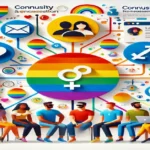Incestflox is a term that has recently gained attention in various online communities, yet it remains somewhat obscure in more traditional, academic, or medical discussions. This article seeks to clarify the meaning, implications, and controversies surrounding the term. By the end, readers will have a comprehensive understanding of its usage, origins, and the critical debates tied to it.
What is Incestflox?
Incestflox is a term that is most often associated with online communities, particularly those centered around niche or extreme topics. It seems to have emerged in subcultures on platforms like 4chan or Reddit, often used in contexts related to extreme, taboo, or controversial themes. The word itself can be broken down into two components:
- Incest – This refers to sexual relations between family members, typically within close familial relationships (such as siblings, parent-child, etc.). In most societies, incest is viewed as a deeply taboo act and is often illegal due to the potential psychological, social, and genetic consequences.
- Flox – While this part of the word is less well-defined, it is speculated that it is a portmanteau or a slang variation of the word “flock” or a derivation of “flow” or “flux,” suggesting movement or change. Some suggest it refers to a “following” or a “group,” often used to describe a group of people who subscribe to or support a particular belief, idea, or trend.
The term incestflox could, therefore, represent a subgroup of individuals who engage in, discuss, or endorse taboo topics, including incestuous relationships. The specific use of the term can vary, though it is generally associated with digital spaces where unorthodox, controversial, or illegal behavior is either discussed or fantasized about.
While not widely recognized in mainstream discourse, the term has seen an increase in use among certain fringe communities on the internet. It is important to distinguish the term’s online usage from more traditional discussions of incest and family relations, which remain heavily stigmatized and illegal in most jurisdictions.
Origins of Incestflox
As is common with many internet-born terms, pinpointing the exact origin of incestflox can be difficult. The internet, with its anonymity and rapidly evolving culture, is often a breeding ground for the creation of niche terms, memes, and phrases. It’s likely that the term began on certain boards or forums where taboo subjects are discussed with little to no regulation. The word’s first usage likely came about around the early 2010s, though it did not gain significant traction until later.
In many cases, words like incestflox are formed by merging culturally charged or taboo words with internet slang. The internet has a history of recontextualizing words with heavy social, moral, or legal implications, often for shock value or as part of online subcultures that exist outside mainstream norms.
It’s essential to note that this term is not used in clinical, legal, or moral discussions about incest. Instead, it appears to be a term used in certain digital spaces to describe a specific set of individuals or behavior, often discussed in very specific, niche internet communities.
The Controversy Surrounding Incestflox
Incest itself is already a controversial topic that has sparked debates for centuries in various cultures, legal systems, and religious doctrines. The main concerns around incest revolve around the following:
- Genetic Risks: In cases of incestuous relationships, the offspring of these unions are more likely to have genetic disorders or health complications. This is due to the higher likelihood of inheriting genetic mutations from close relatives.
- Psychological Impact: Incestuous relationships are often associated with severe psychological consequences, including trauma, emotional abuse, and a range of mental health issues. Victims of incest often experience lifelong consequences, and these relationships are typically non-consensual, with an inherent power imbalance.
- Social and Moral Taboo: In most societies, incest is considered morally wrong and socially unacceptable. It is often seen as a violation of familial bonds and natural social hierarchies. It can also be a form of exploitation and manipulation, especially when there is an imbalance of power between the individuals involved (e.g., an adult and a minor).
- Legal Implications: In many countries, incest is illegal. Laws exist to prevent individuals from engaging in sexual relationships with close family members. These laws are designed to protect individuals from exploitation and to safeguard family structures.
Given the extremely negative connotations and legal ramifications surrounding the concept of incest, the rise of the term incestflox has stirred further controversy. Many view its use as normalization of a subject that is not only illegal but also harmful to the psychological and emotional well-being of those involved.
While some might argue that it’s just a term used by certain subcultures to explore taboo or fringe topics in a detached way, critics of such usage emphasize that language can play a role in shaping attitudes and behaviors. The term incestflox could be seen as an attempt to desensitize or trivialize an extremely sensitive subject.
The Role of Online Communities
As with many terms born out of internet subcultures, the use of incestflox is highly context-dependent. It thrives in specific forums or chat rooms that deal with taboo subjects. The nature of these online spaces, where anonymity reigns and unmoderated discussions are common, makes it possible for extreme views to be expressed freely. These communities often reject mainstream societal norms, including those related to morality, legality, and ethics.
In some ways, online spaces that embrace terms like incestflox can be viewed as a form of countercultural rebellion. They deliberately challenge conventional views on what is acceptable discourse, often under the guise of free expression or dark humor. For others, these spaces provide a platform for discussing marginalized desires or fantasies that would otherwise be silenced or stigmatized in society.
It is important, however, to recognize that the use of such terms in these communities can have real-world consequences. It can contribute to the further desensitization of certain ideas or even facilitate the normalization of harmful behaviors. As with any sensitive issue, the potential for harm is substantial when discussions and behaviors move from the digital realm into the physical world.
Legal and Ethical Concerns
There are significant ethical concerns about the way the term incestflox is used, especially given that it implies a level of engagement with a highly controversial and legally prohibited behavior. Even if used in an online context, the conversations surrounding incest and its normalization can have ripple effects on broader social attitudes.
In some jurisdictions, discussions about incestuous behavior, particularly in online spaces, may be subject to scrutiny by law enforcement if they cross certain boundaries. For example, if content is shared that depicts actual incest or encourages such behavior, it may violate laws related to child exploitation, obscenity, or the distribution of illegal material. These discussions could also cross into the territory of grooming or child sexual abuse, which is both a criminal act and a deeply harmful behavior.
Ethically, there are also questions about the impact of this type of discourse on individuals. People who are exposed to such content, especially young or vulnerable individuals, might be influenced by the normalization of abusive behaviors or unhealthy relationships. These effects can be subtle but dangerous, leading to distorted perceptions of healthy relationships and boundaries.
It is essential to maintain a critical approach to online subcultures that engage with such harmful topics, understanding that the digital world is not immune from real-world consequences.
The Psychological Impact of Incestflox
Beyond the legal and social implications, the psychological ramifications of the normalization or glorification of incest in online communities cannot be overlooked. For some individuals, engaging with such content may be part of a coping mechanism for trauma or a way to explore complex or repressed feelings. However, this kind of engagement can also reinforce unhealthy desires and fantasies, making it difficult for individuals to distinguish between fantasy and reality.
Moreover, the creation of an online subculture that embraces incestuous themes (even in fantasy form) can isolate individuals from broader social norms, leading to feelings of alienation. For those who might already be struggling with issues related to abuse or family trauma, these online spaces could potentially exacerbate feelings of confusion or guilt.
It’s also worth noting that, while some individuals in these communities may not have direct involvement in incestuous behavior, the act of normalizing or trivializing such topics can perpetuate harmful ideas that can affect broader societal views on relationships, boundaries, and consent.
Conclusion
The term incestflox may seem obscure or trivial to some, but it is part of a larger conversation about the internet’s role in shaping and reflecting societal attitudes toward taboo subjects. Whether as a term to describe a specific subculture or as part of a broader exploration of controversial or illegal topics, it raises important questions about the power of language, the responsibility of online communities, and the potential consequences of desensitizing harmful behaviors.
For some, the allure of discussing taboo topics in an anonymous or unmoderated space might seem harmless, but the implications are far more serious. Legal, psychological, and ethical concerns must be taken into account when engaging with such content. It is crucial to maintain a balanced and informed perspective when dealing with such sensitive subjects.
Ultimately, while incestflox may remain a niche term for a small online community, its presence and the conversations it sparks can serve as a reminder of the complex interplay between culture, language, and ethics in the digital age.
Frequently Asked Questions (FAQs)
1. What does the term incestflox mean?
Incestflox is an internet slang term, often associated with niche online communities that discuss taboo subjects, including incest. It may represent a subgroup of people who either explore or endorse controversial topics, though its exact meaning and usage can vary widely depending on context.
2. Is incestflox related to illegal behavior?
The term itself does not directly suggest illegal behavior, but it is closely associated with discussions about incest, which is illegal in many jurisdictions. The content surrounding the term may involve topics that are both morally and legally problematic.
3. Where did the term incestflox originate?
The exact origin of the term incestflox is unclear, but it is believed to have emerged in online communities, particularly on platforms like 4chan or Reddit, where taboo subjects are often discussed without regulation.
4. Why is the use of the term incestflox controversial?
The term is controversial because it deals with incest, a subject that is widely considered taboo, illegal, and harmful to individuals involved. The normalization or trivialization of incest through such terms raises ethical concerns about desensitization to abusive behaviors.
5. Can the use of terms like incestflox affect real-world behaviors?
Yes, there is potential for such terms and the communities surrounding them to influence real-world behaviors. The normalization of taboo or harmful topics can distort perceptions of relationships, boundaries, and consent.
6. What should people do if they encounter harmful content related to incestflox?
If someone encounters content related to incestflox that feels harmful or inappropriate, it is important to report it to platform moderators or authorities. Engaging with such content can have negative psychological and social effects, and reporting it helps keep communities safe.







